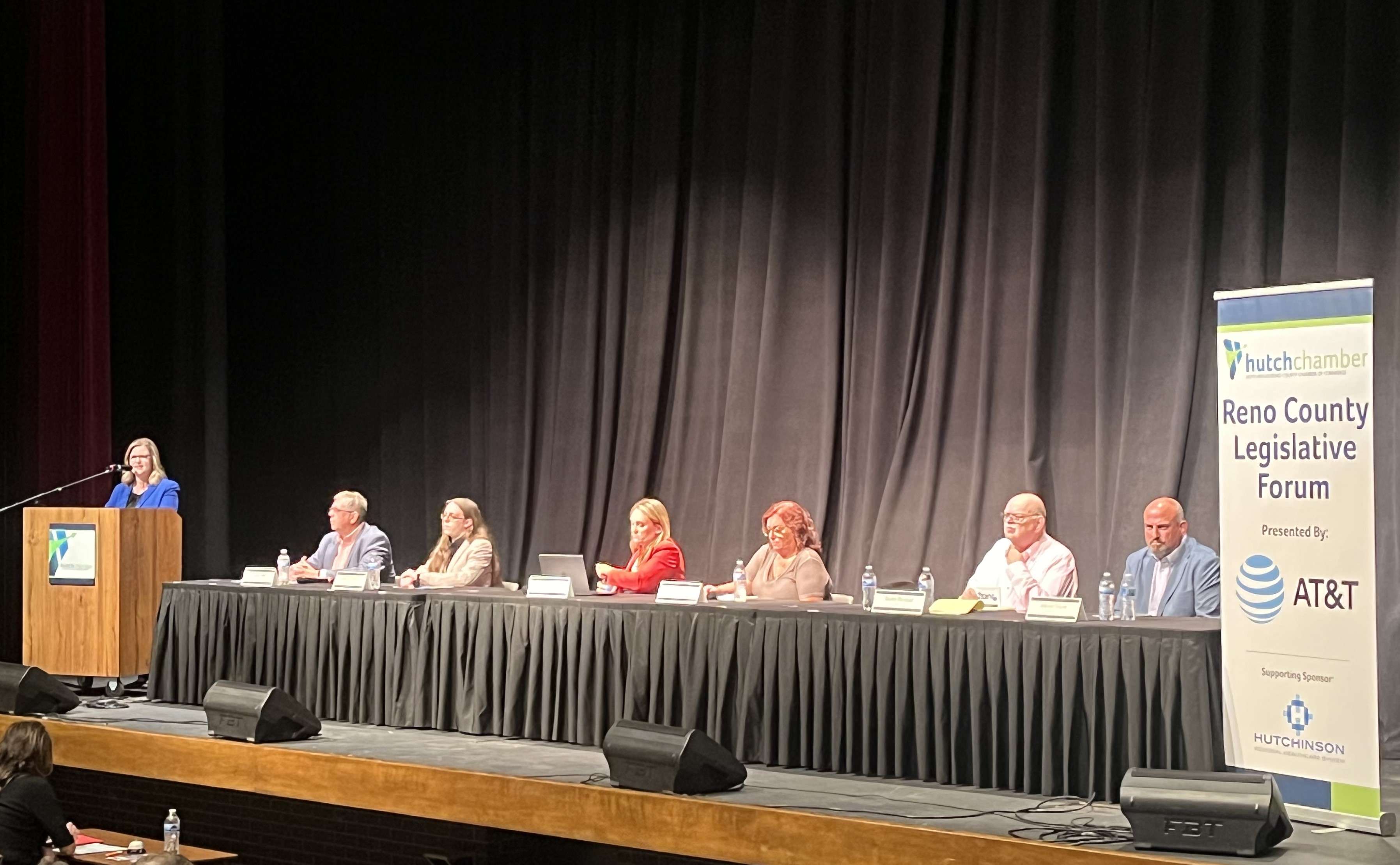
MARC JACOBS
Hutch Post
Six candidates for Hutchinson City Council laid out sharply different visions for the city’s future at a forum hosted by the Hutchinson/Reno County Chamber of Commerce at the Stringer Fine Arts Center on the Hutchinson Community College campus, touching on jobs and housing, tax policy, downtown revitalization, parks, and how to address homelessness.
Chamber President and CEO Debra Teufel moderated the event and reminded attendees that the Chamber “does not endorse candidates,” but sees it as part of its mission to organize opportunities for the community to learn about public policy. The general election is Tuesday, Nov. 4.
Candidates on stage were:
• Southwest District: incumbent Greg Fast and challenger Kaden Winters
• Northwest District: incumbent Stacy Goss and challenger Devon Reese
• At-Large: Carlton “Duke” Devaul and Darrin Truan
The format featured two-minute opening statements, one-minute responses to questions prepared by the Chamber’s Public Policy Committee, optional rebuttals, and one-minute closing statements.
Economic growth, jobs and wages
Several candidates cast jobs and housing as the city’s most pressing issues—though they differed on how to get there.
Fast highlighted relationship-driven economic development, citing annexation and utility planning to make large, shovel-ready sites marketable. He also pointed to a “billion-and-a-half-dollar Evergy energy plant” planned for the area and said Hutchinson is “working hard for economic development.”
Goss framed City Council’s role as accelerating responses to site selectors and aligning infrastructure with growth: “If we’re chasing deals that need millions of gallons [of water] every day and we can’t provide the infrastructure, it does no good.”
Reese said the city must attract new business while confronting what she called some of the highest tax burdens relative to population, arguing high costs deter employers and residents.
Winters argued for higher-wage opportunities and city-backed affordability measures: “We need jobs that pay fair wages and housing that is affordable,” he said, proposing city-owned apartments with income-based rents and stronger support for unionization and worker cooperatives.
Devaul pressed for broader attention beyond downtown, saying neighborhoods—especially on the south side—need investment and that taxes and transparency are top concerns. Truan, a retired Hutchinson Police sergeant, said the city should “make it easy” for builders and businesses to navigate permits and codes, calling for more common-sense problem-solving at City Hall.
Housing: infill, incentives and red tape
On housing, Fast touted partnerships and incentives, noting a local match fund for infill construction through the community foundation and pre-drawn home plans to reduce costs and time for small builders. Goss pointed to streamlining steps for builders, including neighborhood revitalization incentives and exploration of SIP panels after the New Beginnings' tiny-home project.
Reese and Truan said the city should simplify processes so rehab projects and new construction can proceed faster. Winters reiterated his case for city-owned, income-based housing to provide a “stepping stone” out of poverty. Devaul urged help for seniors and young families to stay in their homes, and more repair of older housing stock in the city’s core.
Taxes, budgets and priorities
Pressed on balancing spending and taxes, Truan said he would treat the city budget like a household—funding public safety, water/sewer and streets first, then weighing wants. Devaul favored across-the-board savings—with exceptions for police, fire and EMS—paired with a hard look at priorities.
Goss said Council had already stripped “thousands and thousands of dollars” from proposed projects during workshops and emphasized that some nonprofit allocations are legally required (such as alcohol tax and settlement funds). Reese countered that the city must stay within its means and that funding private charities is not a core municipal role.
Fast cited cost savings from bringing some engineering work in-house and from regulatory cooperation that he said trims $200,000–$250,000 annually on environmental obligations.
Downtown, quality of life and image
Fast called downtown “near and dear,” pointing to state-backed incremental tax financing he said will support projects from Memorial Hall to new downtown apartments without raising local tax rates. Goss tied arts and entertainment options to recruiting young families, advocating for Memorial Hall as a year-round venue and noting the city’s Liberalization of codes that can hinder builders.
Reese pushed for more attractions and beautification—“make the town nice and inviting”—including better mowing and upkeep. Winters proposed sidewalk repair and seating to make walking safer and more enjoyable, and more consistent programming at the fairgrounds outside State Fair season. Truan said the city should better promote what already exists, pursue more live-music opportunities, and remove unnecessary hurdles for downtown investors. Devaul cautioned against focusing only on Main Street, saying other corridors and neighborhoods also need attention.
Parks and trails: protect, pause, or pare back?
Parks and trails split the field. Goss defended them as essential to quality of life and home values—features young families weigh alongside schools and safety. Truan and Devaul praised the system but said expansions may need to pause while core infrastructure is addressed. Winters said he enjoys the parks but would consider temporary reductions if necessary to prioritize housing and food security. Fast noted Hutchinson has more park acreage per capita than cities of similar size and suggested focusing on efficiency while preserving signature amenities like the accredited zoo.
Homelessness, mental health and public order
On homelessness, candidates repeatedly linked the issue to mental illness and substance use. Fast pointed to a monthly coalition he helped start that gathers city staff, law enforcement and nonprofits to coordinate responses, while stressing constitutional limits on displacing people from public spaces.
Reese called for more space and services while insisting the city confront public-safety concerns for businesses and parks. Winters urged more rehabilitation programs and partnerships with the state. Truan said many unhoused residents decline services and proposed convening a broader task force of treatment, housing and outreach providers; Devaul agreed the community needs coordinated solutions.
Access and accountability
All six pledged to be reachable—through public meetings, phone, email and social media—with several noting they already attend every council meeting.





